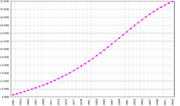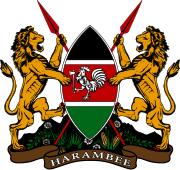
Introduction  Kenya, officially the Republic of Kenya (Swahili: Jamhuri ya Kenya), is a country in East Africa. With a population of more than 47.6 million in the 2019 census, Kenya is the 28th-most-populous country in the world and 7th most populous in Africa. Kenya's capital and largest city is Nairobi, while its oldest and second-largest city, is the major port city of Mombasa, situated on Mombasa Island in the Indian Ocean and the surrounding mainland. Mombasa was the capital of the British East Africa Protectorate, which included most of what is now Kenya and southwestern Somalia, from 1889 to 1907. Other important cities include Kisumu and Nakuru. Kenya is bordered by South Sudan to the northwest, Ethiopia to the north, Somalia to the east, Uganda to the west, Tanzania to the south, and the Indian Ocean to the southeast. Kenya's geography, climate and population vary widely, ranging from cold snow-capped mountaintops (Batian, Nelion and Point Lenana on Mount Kenya) with vast surrounding forests, wildlife and fertile agricultural regions to temperate climates in western and rift valley counties and further on to dry less fertile arid and semi-arid areas and absolute deserts (Chalbi Desert and Nyiri Desert). Kenya's earliest inhabitants were hunter-gatherers, like the present-day Hadza people. According to archaeological dating of associated artifacts and skeletal material, Cushitic speakers first settled in Kenya's lowlands between 3,200 and 1,300 BC, a phase known as the Lowland Savanna Pastoral Neolithic. Nilotic-speaking pastoralists (ancestral to Kenya's Nilotic speakers) began migrating from present-day South Sudan into Kenya around 500 BC. Bantu people settled at the coast and the interior between 250 BC and 500 AD. European contact began in 1500 AD with the Portuguese Empire, and effective colonisation of Kenya began in the 19th century during the European exploration of Africa. Modern-day Kenya emerged from a protectorate established by the British Empire in 1895 and the subsequent Kenya Colony, which began in 1920. Numerous disputes between the UK and the colony led to the Mau Mau revolution, which began in 1952, and the declaration of independence in 1963. After independence, Kenya remained a member of the Commonwealth of Nations. The current constitution was adopted in 2010 and replaced the 1963 independence constitution. (Full article...)
Selected article - Agriculture in Kenya dominates Kenya's economy. 15–17 percent of Kenya's total land area has sufficient fertility and rainfall to be farmed, and 7–8 percent can be classified as first-class land. In 2006, almost 75 percent of working Kenyans made their living by farming, compared with 80 percent in 1980. About one-half of Kenya's total agricultural output is non-marketed subsistence production. Agriculture is also the largest contributor to Kenya’s gross domestic product (GDP). In 2005, agriculture, including forestry and fishing, accounted for about 24 percent of the GDP, as well as 18 percent of wage employment and 50 percent of revenue from exports. (Full article...) Selected picture -Selected location -Machakos is a town in Kenya, 64 kilometres southeast of Nairobi. It is the capital of the Machakos County, Kenya. Machakos Town is a major urban centre, and also a satellite town due to its proximity to Nairobi. Its population is rapidly growing and is 150,041 as of 2009. People who live here are mostly the Akambas though it is a cosmopolitan town. Machakos is surrounded by hilly terrain, with a high number of family farms. (Read more...) This is a Good article, an article that meets a core set of high editorial standards.
Kenya sent a delegation to compete at the 2006 Winter Olympics in Turin, Italy, from 10–26 February 2006. This was Kenya's third time participating in a Winter Olympic Games. The Kenyan delegation consisted of one athlete, cross-country skier and three-time Olympian Philip Boit. In his only event, he finished 91st in the men's 15 kilometre classical. (Full article...) Selected biography -Julius Yego (born 4 January 1989) is a Kenyan track and field athlete who competes in the javelin throw. Nicknamed "Mr. YouTube" because he learned how to throw by watching YouTube videos of javelin athletes, Yego is the African record holder for the event with a personal best of 92.72 m. He won the javelin title at the All-Africa Games in 2011 and at the African Championships in Athletics in 2012 and 2014; at the 2013 World Championships he placed fourth, losing a medal in the final round. In 2014, he became the first Kenyan to win a Commonwealth Games gold medal in a field event. At the 2015 World Championships he won the gold medal with a throw of 92.72m, becoming the first Kenyan to win a World Championships gold medal in a field event. He won silver at the 2016 Summer Olympics in Rio de Janeiro. (Full article...) Related portalsDid you know (auto-generated) -
In the news
Wikinews Kenya portal
Selected panorama -Sunset at Lake Victoria.
General images -The following are images from various Kenya-related articles on Wikipedia.
Topics in KenyaCategoriesAssociated WikimediaThe following Wikimedia Foundation sister projects provide more on this subject:
Discover Wikipedia using portals |









































